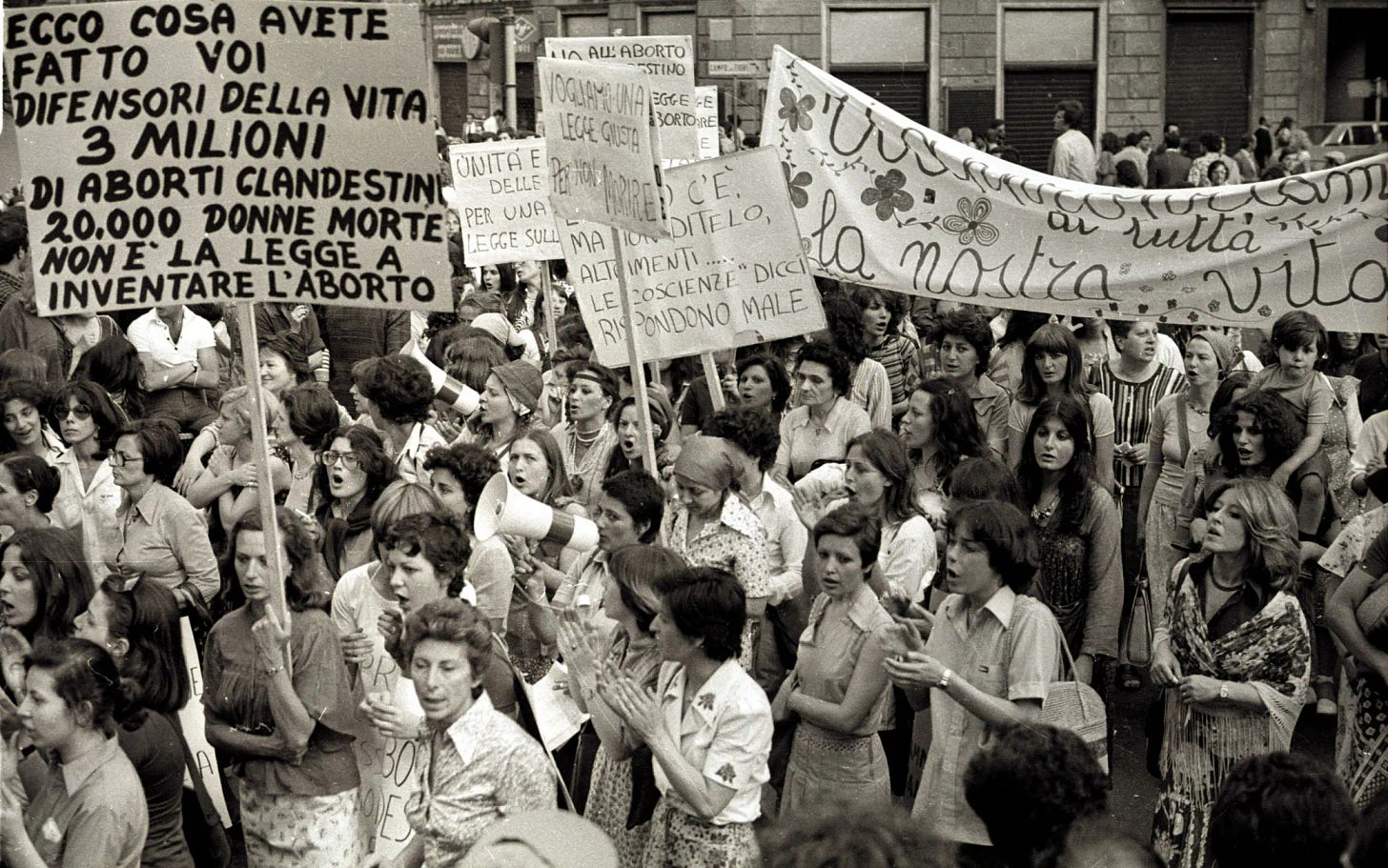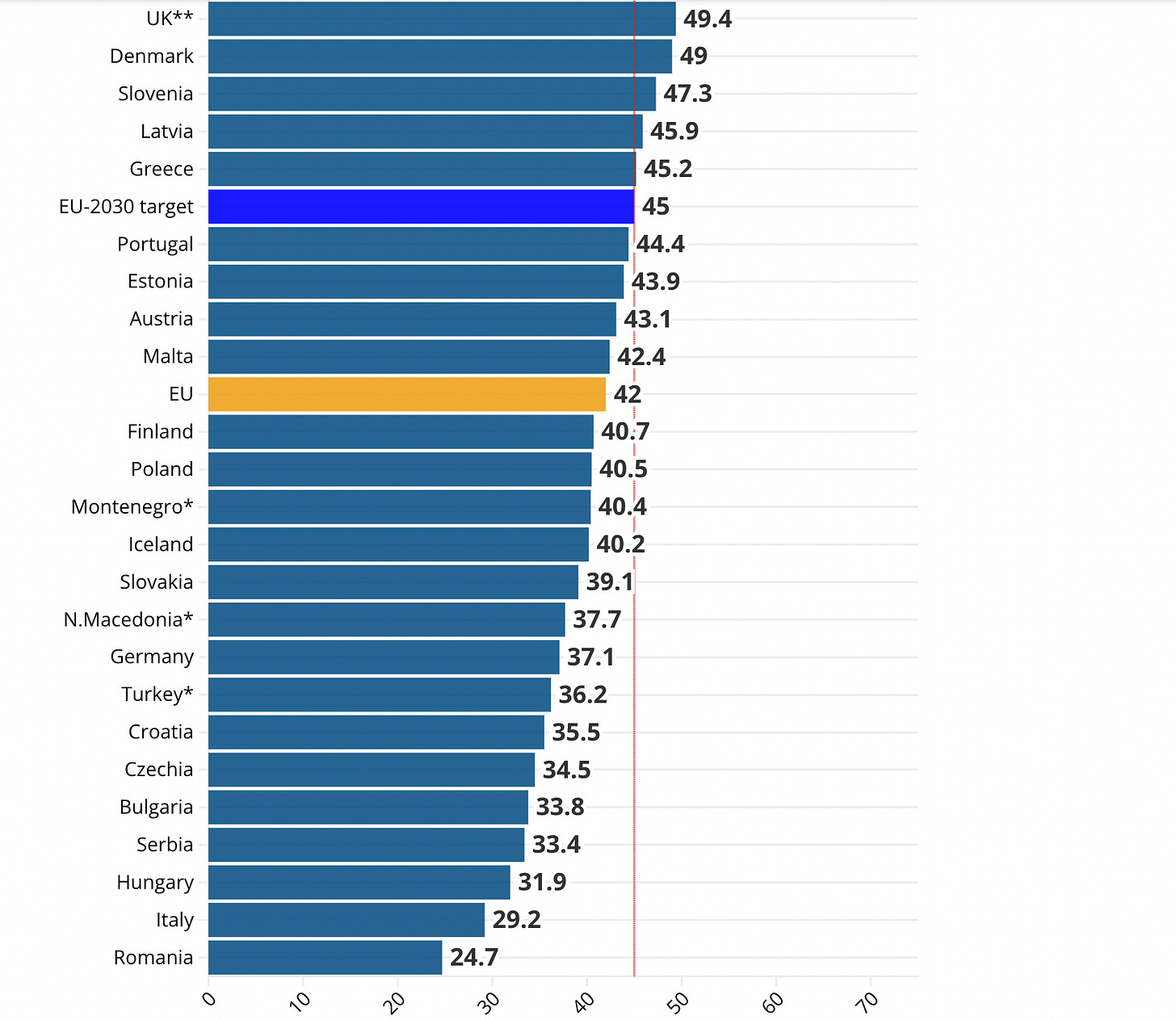If by any chance you’re still operating under the illusion that Giorgia Meloni’s government has proved more timid than was to have been expected, or more specifically that her administration has been surprisingly ‘moderate’ on social policies then think again. This Tuesday, the Italian parliament passed legislation that, in the words of the bill, will allow “non-profits” with “experience providing maternity support” into family planning centres. Translated into plain English: the government is now allowing anti-abortion activists, including American-funded far-right groups, to enter abortion clinics. This is, at a first glance, one of those shocking, attention-grabbing headlines. But it’s worth contextualising for a moment: first-off, reproductive rights have long been precarious in Italy. 64% of doctors here already refuse to carry out abortions on religious or ethical grounds. In regions like Marche (where Fratelli d’Italia enjoy a strong majority), pro-life activists have been spreading their messages unimpeded, and spreading fake news stories without repercussions for years. Many international observers seem to have been anxiously waiting for some turning point, for the moment when Meloni will reveal herself as a real tyrant by, say, making abolition illegal for good. The fact is, she has no need to do so. This government is slowly, gradually, consolidating its regional hegemony to develop a new national policy of sorts. As Luisa Rizzitelli, a women’s rights activist, put it earlier this week: “This measure might seem like a small thing, but symbolically it is very strong and serious – the government is giving a clear sign in that they want to do everything possible to persuade women to change their minds. This shouldn’t be happening.” For more info check out this ENG overview by POLITICO.

A few days ago I stumbled across some rather disturbing (new) data about education in Italy which I felt compelled to share here. According to a 2024 Eurostat survey, Italy ranks second bottom of the EU when it comes to the level of tertiary training among 25-34 year olds. What this means, in simple terms, is that there are fewer young people with college, university, and vocational qualifications in Italy than any other EU nation, save Romania. The euronews report where I encountered this fact looks at the whole continent, and, as a result, it’s limited in its in-depth analysis. What the journalists fail to note vis-a-vis Italy is that the overwhelming proportion of untrained, uneducated people dwell in the the South of the country. Lombardy, Emilia Romagna and Tuscany are actually (still) home to some of the best educational facilities in the world. Campania, Puglia, Calabria and Sicily, by contrast, are plagued by chronic underinvestment and catastrophic dropout rates. While Italy, in some respects, remains a first world European nation, and one of the biggest economies in the EU, stats like these are a sobering reminder of what a poor job politicians have done in ensuring the country as a whole will have a sustainable future. Check out the full report to find out more about Italy’s place in the pan-EU context.
Ever since Silvio Berlusconi died back in the summer of 2023 the Italian media has been obsessed with narrating his legacy. RAI, MediaSet, La7 have all been at it, commissioning and broadcasting a plethora of, by and large, mediocre productions. It was only a matter of time, of course, before Netflix jumped on the band wagon — and they did indeed this week in the form of a new mini-series called ‘The Young Berlusconi’. Don’t be fooled by the title. This isn’t some sort of rom-com or detective show; it’s actually a week by week, month by month, documentary account of il Cavaliere’s rise in the worlds of business and politics. We’re introduced to Silvio in Milan, in the peak 70s, when he made his early cash though construction before moving into TV. From then on, the show charts the story of how, from the brink of financial ruin, he turned things around, won over the hearts and minds of millions of Italians and ultimately secured himself the role of Prime Minister. Reviews have been mixed. And while I’ve only watched 20 minutes or so, I’d say Giulio Zoppello has got the nail on the head with his take for WIRED magazine. In his words: “of course, no one will change their mind after seeing the film […] Silvio Berlusconi was our story, our life, but perhaps we haven't yet understood whether it was more of a dystopian tragedy or simply a parody.” Check it out on Netflix [ITA only for now, I’m afraid].
Arts and culture: Foreigners Everywhere!
This weekend marks the inuguration of the most important art event in Italy’s cultural calendar. On Saturday 20 April the 60th Venice Art Biennale will open its doors to the press and public. My inbox has been exploding with PR about this year’s edition for weeks now, so I’m pretty interested to see the works on display. The lead curator for 2024 is Adriano Pedrosa and his chosen theme is Stranieri Ovunque – Foreigners Everywhere (a phrase, incidentally, that was first coined by a Sicilian art collective and then taken up by an anti racist movement in Turin during the early 00s.) Pedrosa is the first ever Latin American to curate the Biennale and it’s interesting that, as a “non-European”, he has chosen to stand up so vocally against the right-wing nationalist agenda that is so prevalent in Italy and elsewhere in Europe. I mean, just think about Georgia Meloni or Matteo Salvini’s “Italians first” agenda and compare this with the Biennale’s cosmopolitan framing: “wherever you go and wherever you are you will always encounter foreigners— they/we are everywhere […] no matter where you find yourself, you are always truly, and deep down inside, a foreigner.” While I still have doubts about how seriously one can actually mount social resistance through the field of corporate art I’ll be reporting on this properly with an open mind once I’ve seen the exhibits in person. In the meantime, check out the official event page for more info.

The London based writer and academic Jo Hamya - author of the 2021 novel Three Rooms - has got a new Italy-based book out next week called The Hypocrite which may be of interest for readers that enjoy a good psychological drama. The basic premise, or rather the central theme, concerns a struggling marriage: a family go on holiday to a small island off the coast of Sicily where, despite the scenery, the sea, the summer air, long-festering tensions boil over with catastrophic results. An original plot? Not exactly. But the storytelling itself is not so straightforward. As in Hamza’s previous work, the action is cut up, the chronology is non-linear, the lines between fact and fiction, biography and theatre begin to blur in a manner vaguely reminiscent of Rachel Cusk or Deborah Levy (forgive the comparisons). If this makes the work sound somewhat garbled or derivative, it isn’t. Trust me, the prose flows far more convincingly than this wee snippet would suggest. Check this one out, anyway, if you’re after a thought provoking read with a good dose of Italian summer vibes thrown into the mix. You can pre-order here from the UK publisher.
Recipe: Gnocchi With Smashed Peas Lemon & Parmesan
Another blast of spring greens this week: this time I’m taking inspiration from the team at Mob Kitchen. If you don’t know Mob, they are, to put it simply, a rag tag band of young, largely millennial chefs who are cooking-up food that is both extremely pleasant to look at on social media and, as it happens, very tasty too. A friend recently put it to me that Mob represents “food porn, but actually good” and having subscribed since January this year, I for one can vouch for that. This week, snowed under with work, I prepped-up one of their “Italian inspired” dishes that the recipe promised would be ready in less than 30 minutes. My expectations were fairly low, but the results were fabulous. I’m talking, specifically, about their ‘Gnocchi With Smashed Peas Lemon & Parmesan’; a vaguely Italian-American-ish dish that takes the flavours of traditional cuisine - e.g. vignarola - but which obliterates 99% of the faff. Let me reiterate, once again: this is a functional recipe. A quick, healthy dish that works splendidly for a midweek meal. Just one thing: If you want to avoid crème fraîche, or you can’t get it easily, marscarpone or cream cheese will do the job just fine. Here’s the link.
I’m Jamie Mackay, a UK-born, Italy-based writer, working at the interfaces of journalism, criticism, poetry, fiction, philosophy, travelogue and cultural-history. I set up ‘The Week in Italy’ to make a space to share a regular overview of the debates and dilemmas, innovations and crises that sometimes pass under the radar of our overcrowded news feeds, to explore politics, current affairs, books, arts and food. If you’re a regular reader, and you enjoy these updates, I hope you’ll consider becoming a supporter for EUR 5.00 per month. I like to think of it as a weekly catch-up chat over an espresso. Alternatively, if you’d like to send a one-off something, you can do so via PayPal using this link. Grazie!





